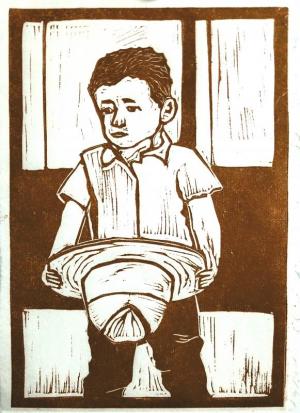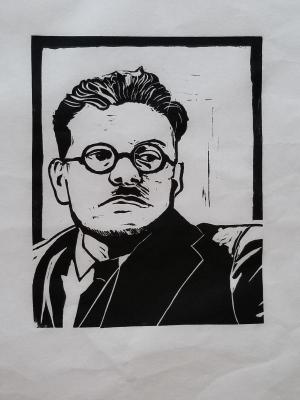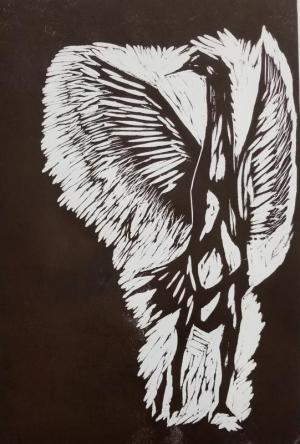Mark Harris: A man of many hats
Mark Harris is a priest, artist, poet, activist and cancer survivor, and he says every single one of those roles has made him into the man he is today.
“It all makes for a pretty energetic and, frankly, a very good life,” he said. “I feel very blessed.”
The 79-year-old Lewes resident is a well-traveled man, growing up in Venezuela before moving to New Orleans as a teenager. As an adult, he taught philosophy in Canada, attended seminary school in Boston, and, more recently, traveled to Haiti, Romania and the Philippines to do work with the Episcopal church.
And while much of his life centers around the church, he said, it often meshes with his poetry and art. Harris’ preferred medium is printmaking, specifically relief prints. In relief printing, an artist cuts or etches a surface, typically wood or linoleum blocks. Ink is applied and the image is printed.
His latest works will be on display at Rehoboth Art League from Friday, Oct. 18 through Sunday, Nov. 24. The exhibit Most Wanted: Print Making, Public Art, and Political Action, consists of a series of linocuts of Mexican artists who painted murals and used printmaking during the political struggles following the 1910-20 Mexican revolution.
“The power behind printmaking is that it makes whatever you do available to lots of people,” Harris said. “So a lot of the images I do tend to be trying to convey some sort of message.”
Harris is interested in a variety of messages, from celebrating life to caring for the environment to getting involved in the civic process.
He’s been active as a printmaker for about eight years. It all stems from his work as a poet. One morning several years ago, Harris woke up and wrote a poem. He thought it was pretty good, so he sent it to an online editor. After a few corrections, the editor published it that afternoon.
“I thought, ‘There’s something wrong with this,’” he said. “There should be more sweat equity in producing this poem. I’m supposed to agonize over the words and do some thinking.”
After that experience, he thought about how he approaches his work. He considered using a typewriter for his poems, but the process still seemed too quick.
That’s when he decided to go back in time, choosing to set the type for his poems, much like Benjamin Franklin did when he first started to produce newspapers.
“I thought that if I have to set the type, then I’ll actually have to think about every individual letter,” he said. “It would make me more concise, because who actually wants to set more type? It’s satisfying, but very tedious.”
The new process accomplished his goal.
“It did slow me down, and I did think more about every individual word,” he said. “But I also discovered why we invented all these other things – setting type is actually really boring.”
But it was that experience that piqued his interest in printmaking.
Two years ago, Harris did an art residency at the Arquetopia Foundation in Puebla, Mexico. His experience there was the inspiration for his latest show in Rehoboth.
“It was there I really began to realize the role of printmaking in political life,” he said.
Four years ago, he was a resident artist at the National School of the Arts in Port-au-Prince, Haiti, teaching a class to local artists. But first he had to overcome a language barrier.
“I was teaching by example,” he said. “I would do something, and they would copy it. It was exciting to work with young, Haitian artists who were very creative and interesting.”
Harris has been traveling to Haiti for 50 years. He tries to visit every few years. During his most recent trip a few weeks ago, he said, he visited with a Haitian musician and ethnographer. He’s trying to work with the man to have a set of his poems called Requiem for the Dictator translated into Haitian Creole. The ultimate goal, he said, is to have it made into a theatrical production.
Harris’ daily duties are as priest associate at St. Peter’s Episcopal Church in Lewes. He’s been a priest for 51 years, the last 16 in Lewes.
Despite dedicating his life to the church, he said, he wasn’t sure of his path earlier in his life. He initially thought he’d like to be a mathematician.
“I realized actually I was much more people-oriented than that, so I thought maybe I’d be a sociologist,” he said, but that didn’t seem to do it either.
He then got really interested in philosophy.
“That sort of led me to work on who I was as a Christian,” he said. “I didn’t grow up with the feeling that I ought to be a priest. That’s something that came to me as kind of a product of thinking through where I was going and my experiences. I was 22 before I thought much about it.”
Harris and his wife Kathryn moved to Delaware in 1972, when he became chaplain at the University of Delaware in Newark.
“When we first moved to Delaware, we thought we’d be here for six to eight years, and that would be it,” he said. “But here we are.”
The couple bought a home in Lewes in 1998 and moved to the First Town in 2003. The community has really embraced him and his family. During and after receiving treatment for cancer three years ago, he said, the residents of Lewes showed overwhelming support. Many waited for him with signs on the drawbridge upon his return to Lewes. Those gestures inspired him to get involved in local government.
“I thought that I really needed to give back to the community in some way,” he said.
Mayor Ted Becker appointed him to the Lewes Planning Commission, where he still serves.
He’s also been an integral part of the biweekly nonpolitical silent vigil along Savannah Road aimed at showing support for migrant families separated at the border and families affected by immigration raids.
Nick Roth is the news editor. He has been with the Cape Gazette since 2012, previously covering town beats in Milton and Lewes. In addition to serving on the editorial board and handling page layout, Nick is responsible for the weekly Delaware History in Photographs feature and enjoys writing stories about the Cape Region’s history. Prior to the Cape Gazette, Nick worked for the Delmarva Media Group, including the Delaware Wave, Delaware Coast Press and Salisbury Daily Times. He also contributed to The News Journal. Originally from Boyertown, Pa., Nick attended Shippensburg University in central Pennsylvania, graduating in 2007 with a bachelor’s degree in journalism. He’s won several MDDC awards during his career for both writing and photography. In his free time, he enjoys golfing, going to the beach with his family and cheering for Philadelphia sports teams.


























































